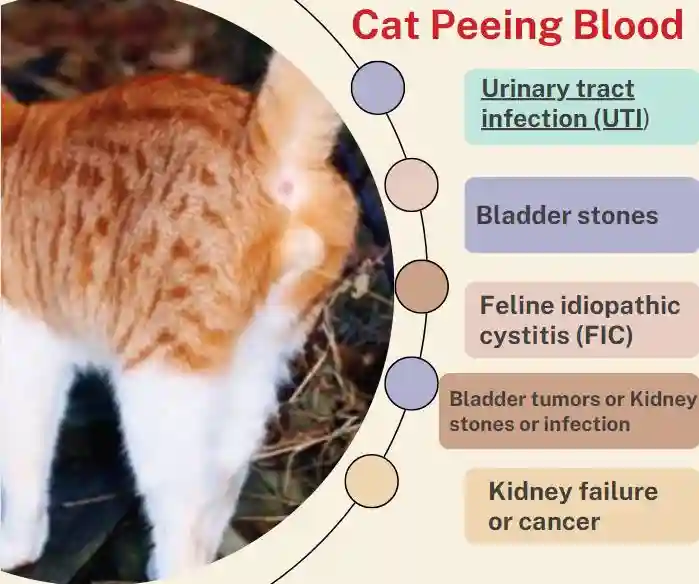If you see blood in your cat’s urine, you might be worried. This is not a normal sign and it can mean that your cat has a problem with their urinary system. Blood in cat urine is also called hematuria. It can be caused by different conditions that affect the kidneys, bladder, or urethra. Some of these conditions are minor and easy to treat, while others are more serious and need urgent attention. In this article, we will explain the possible causes of blood in cat urine, how to diagnose cat peeing blood, and how to treat them.
Causes of Blood in Cat Urine

There are many possible causes of blood in cat urine. Some of the most common ones are:
- Urinary tract infection (UTI): This is when bacteria infect the bladder or the urethra. It can cause inflammation, pain, and bleeding. UTIs are not very common in cats, but they can happen if the cat has other health problems that affect the urine, such as diabetes or kidney disease. UTIs are diagnosed by testing the urine for bacteria and are treated with antibiotics.
- Bladder stones: These are hard mineral deposits that form in the bladder. They can irritate the bladder wall and cause bleeding. They can also block the flow of urine, which is a medical emergency. Bladder stones can be seen on X-rays or ultrasound and can be of different types. Some can be dissolved with special diets, while others need surgery to remove them.
- Feline idiopathic cystitis (FIC): This is the most common cause of blood in cat urine. It is also known as feline lower urinary tract disease (FLUTD) or Pandora syndrome. It is a condition where the bladder becomes inflamed for unknown reasons. It is linked to stress and is more common in indoor, overweight, female cats on dry food. FIC can cause pain, frequent urination, and blood in the urine. FIC is diagnosed by ruling out other causes of bladder problems and is treated with pain relief, stress management, and environmental enrichment.
Common causes of blood in cat urine

Other less common causes of blood in cat urine include:
- Bladder tumors: These are abnormal growths of cells in the bladder. They can be benign or malignant (cancerous). They can cause bleeding, pain, and difficulty urinating. Bladder tumors are diagnosed by biopsy and are treated with surgery or chemotherapy, depending on the type and stage of the tumor.
- Kidney stones or infection: These are problems that affect the kidneys or the tubes that connect them to the bladder (ureters). They can cause blood in the urine, as well as other signs such as fever, weight loss, and vomiting. Kidney stones or infections are diagnosed by blood tests, urine tests, X-rays, or ultrasound and are treated with antibiotics, pain relief, or surgery.
- Kidney failure or cancer: These are serious conditions that affect the function of the kidneys. They can cause blood in the urine, as well as other signs such as increased thirst, increased urination, loss of appetite, and weakness. Kidney failure or cancer is diagnosed by blood tests, urine tests, X-rays, or ultrasound and is treated with supportive care, medication, or dialysis.
Diagnosis of Blood in Cat Urine
If you see blood in your cat’s urine, you should take them to the vet as soon as possible. The vet will examine your cat and ask you some questions about their history, behavior, and diet. The vet will also take a sample of your cat’s urine and test it for blood, bacteria, crystals, and other abnormalities. The vet may also do some other tests, such as blood tests, X-rays, or ultrasounds, to check for the cause of the blood in the urine. The vet will then tell you the diagnosis and the treatment options for your cat.
Treatment of Blood in Cat Urine

The treatment of blood in cat urine depends on the cause of the problem. Some of the possible treatments are:
- Antibiotics: These are used to treat urinary tract infections and kidney infections. They kill the bacteria that cause the infection and reduce the inflammation and bleeding. Antibiotics are given by mouth or by injection and need to be taken for the full course prescribed by the vet.
- Pain relief: These are used to treat pain and discomfort caused by bladder stones, bladder tumors, kidney stones, or FIC. They can be given by mouth, by injection, or by patch and need to be used as directed by the vet. Pain relief can help your cat feel more comfortable and reduce the stress that can worsen bladder problems.
- Diet: These are used to treat or prevent bladder stones or FIC. They can help dissolve some types of stones or prevent them from forming. They can also help reduce the inflammation and stress in the bladder. Diet can be given as wet or dry food and needs to be followed strictly as advised by the vet.
- Surgery: These are used to treat bladder stones, bladder tumors, or kidney stones that cannot be treated with other methods. They involve removing the stones or tumors from the bladder or the kidney. Surgery can be done by open or minimally invasive techniques and needs to be done by a skilled vet. Surgery can cure the problem or improve the quality of life of your cat.
- Supportive care: These are used to treat kidney failure or cancer. They involve giving fluids, electrolytes, vitamins, and other medications to support the function of the kidneys. They can also involve dialysis, which is a machine that filters the blood and removes the waste products. Supportive care can help your cat feel better and live longer.
Conclusion
Blood in cat urine is not a normal sign and can indicate a problem with the urinary system. It can be caused by different conditions that affect the kidneys, bladder, or urethra. Some of these conditions are minor and easy to treat, while others are more serious and need urgent attention. If you see blood in your cat’s urine, you should take them to the vet as soon as possible. The vet will diagnose the cause of the problem and recommend the best treatment for your cat. With proper care, your cat can recover from the problem and live a happy and healthy life.




